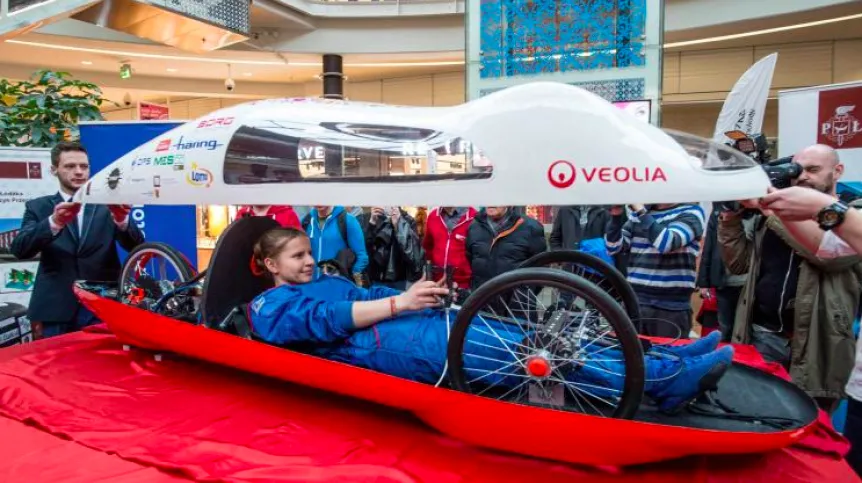
Eco Arrow 3.0 is the latest version of the car built by Lodz University of Technology students from the Iron Warriors team. Young constructors hope that thanks to modern solutions they will exceed 1000 kilometres driven on 1 litre of fuel.
The team Iron Warriors from the Students` Science Circle of Motoring Enthusiasts are Polish record holders in the number of kilometres driven on one litre of fuel. The earlier version of their car Eco Arrow 2.2 was capable of driving 837 km on one litre of fuel.
The three-wheeled car built by students from Łódź competes in the category of gasoline prototypes. It has an aerodynamic, streamlined shape and is extremely lightweight. The driver drives the vehicle lying down, but the new version has a steering wheel instead of levers like in the previous cars.
"This is the third version of our car, significantly improved compared to the previous one. It is much lighter, we changed certain assumptions when building the frame, and we are currently working on developing a new engine for this car" - says Jakub Szychowski from Iron Warriors Team.
The new, much lighter body of the car is made of a composite based on carbon fibre in epoxy resin. The body is additionally reinforced by a polymer foam floor.
"We try to make all metal parts from aviation aluminium, which allows us to obtain the best strength to vehicle weight ratio. Of course, some parts must still be made of steel, but we try to limit the amount of steel to a minimum" - adds Szychowski.
The new version of the Eco Arrow has a new drive system and a modified clutch. The vehicle has an internal combustion Honda engine commonly used in ... motor scythes. It has been modified by students - they removed the carburettor, installed electronic injection, on-board computer and sensors.
"In the factory configuration, the engine uses a carburettor. We have modified it for a sequential injection, so we have indirect injection like in modern cars" - adds the co-designer of the vehicle.
Lodz University of Technology students have already started in nine European competitions with their cars. In 2015, they set a Polish record with a result of 830 km/l. A year later, they broke it improving the result by about 7 km. The year 2016 also brought them first place in the category of gasoline-powered prototype vehicles at Educ Eco in Valenciennes, the prize for the design of Eco Arrow 2.2 and 2nd place during the Le Mans competition.
The competitions themselves are quite specific. Speed does not matter, only the innovative solutions that reduce fuel consumption. During the competition each team has several attempts to travel the designated distance in the given time.
"This forces us to have an average speed, but our driving strategy is that the car`s engine is not on all the time. We drive in pulses - we start the engine, accelerate, then the engine is switched off and we drift through most of the track. We repeat that about 2-3 times in each lap. This is the most economical form of driving, but impossible to achieve in urban traffic" - explains Szychowski.
After the end of the test, the volume of consumed fuel is measured, and the distance the car would drive on 1 litre of fuel is calculated on this basis.
This year, students from Łódź plan to start in four competitions with Eco Arrow 3.0 - two in France in May, in Shell Eco-Marathon in London at the turn of July, and finally in the Pisaralla pisimmalle competition in Nokia, Finland.
Since the new car is much lighter and more aerodynamic and technologically advanced than its predecessors, the young constructors are going for over 1000 km driven on one litre of fuel, which would give them a place among the top European teams.
"We have the highest expectations for the competition in Finland at the end of the summer, because we have been improving the record there for the last two years. We hope that this year we will also improve it and break this threshold of 1000 km per one litre of fuel" - concludes Szychowski. (PAP)
PAP - Science in Poland, Kamil Szubański
szu/ zan/ kap/
tr. RL













